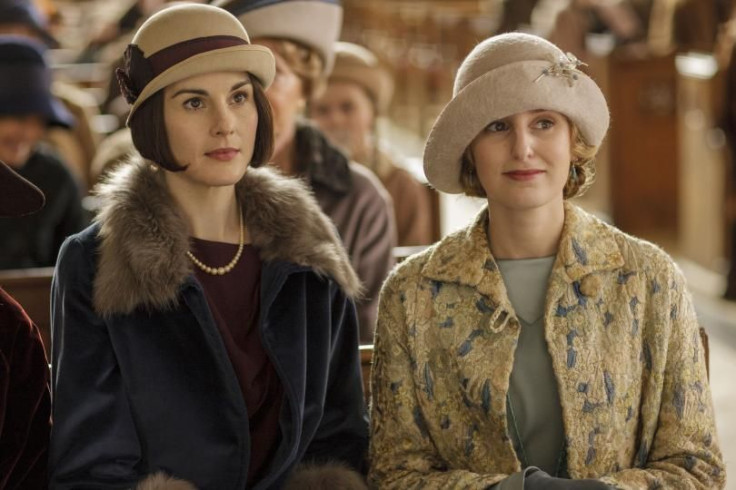As 'Downton Abbey' Ends, Streamers Court Americans Hooked On British TV

“Downton Abbey” is coming to an end Sunday after six seasons, but luckily for fans of the popular show and British television in general, the TV landscape is not quite as archaic as the Crawley family.
Unlike with previous PBS hits in the pre-Netflix era, the series finale of “Downton Abbey” does not mean the end of some American viewers' exploration of British TV. An explosion of streaming services in recent years has helped fuel an expansion of the U.S. audience watching British and other international content. In some cases, streaming services are even competing to provide that content and convert the "Downton Abbey" broadcast audience to the digital age.
There are myriad reasons why “Downtown Abbey,” an upstairs-downstairs drama with old-school sensibilities, became a rare broadcast hit with critical appeal. The show premiered as cable and Netflix were flooding the market with shows geared toward more specialized audiences, while viewers in turn began demanding content that suited their specific tastes. Other shows that debuted around the same time included AMC's "The Walking Dead," HBO's "Game of Thrones" and Showtime's "Homeland."
PBS has been airing British dramas — many, like “Downton,” under the “Masterpiece” banner (formerly “Masterpiece Theatre”) — since the early 1970s with a lot of success. However, with “Downton Abbey,” something was different.
“If you watched ‘Brideshead Revisited’ in 1981 and really, really, liked it, the only thing you could really do is go, ‘I like British dramas. I’m going to watch the next time PBS airs one,’” said Robert Thompson, director of the Bleier Center for Television and Popular Culture at Syracuse University in New York.
Now streamers are saturated with British and other international content. Netflix alone has “Sherlock," "Luther," "Black Mirror," "Peaky Blinders” and dozens more.
Founded in 1997, Acorn DVD, an arm of RLJE International, was a profitable purveyor of DVDs for the niche audience that followed British television. These days, Acorn TV is a growing streaming service catering to Americans with a hunger for British mysteries and drama, with over a quarter of a million subscribers.
“‘Downton Abbey’ probably got a lot of people into watching [British content] on TV and streaming,” Mark Stevens, president of Acorn TV, said. “The tech platforms have also done a lot to give people more choices and more access, and you can reach these people more effectively. There were not a lot of platforms for this content before the digital age.”
Amazon, Hulu and even cable networks are getting in on the game, as streamers hope those broadcast viewers, predominantly white and older, find their way online to their libraries.
“If you are a PBS viewer and it has a style to it that you prefer, you aren’t seeing much other content like that on Network or even on cable,” Stevens said. “A lot of people think [that audience is] not comfortable with new technology, but actually streaming is not that big of a jump for them.”
Streamers are not just courting viewers who have been watching British TV for years. Shows like "Sherlock," a modern-day adaptation of the literary detective starring crossover movie stars Benedict Cumberbatch ("The Imitation Game," "The Hobbit") and Martin Freeman ("The Hobbit," "The World's End"), appeal to younger, more tech-savvy viewers.
“It is an audience that is expanding,” Thompson said. “You have a base, specialized audience that is transferring [from broadcast] and has always liked this stuff, and there is a new generation of that, but [the audience] is also expanding as well. The multiple venues and the ease in which people can watch this content at any time had brought in a new audience that would not have been there in the old distribution model.”
"Downton Abbey" premiered just as streaming went mainstream, raising the question of if the show turned its massive audience on to British television or benefited from the genre's streaming-fueled increase in popularity.
“I definitely think [“Downton Abbey”] changed the game,” Stevens of Acorn TV said. “The size of the audience and the number of people who were aware of the show — I was always surprised by the amount of people that I would not have guessed were fans who were talking about the show and it was their first experience [with British TV].”
What does that mean for the broadcaster that gave fans “Downton” in the first place? Streaming is “absolutely good for us,” Beth Hoppe, chief programming executive at PBS, said. “There is more competition, but there is also more good product.”
Hoppe said that as viewers have demanded more content, creators have delivered. Before “Downton Abbey,” PBS slotted one hour of “Masterpiece” or other British content at 9 p.m. Now the entire block between 8 p.m. and 11 p.m. on the national broadcast is devoted to British drama.
“Being able to catch up on shows gets people excited and drives them back to the broadcast,” Hoppe said. “It led to a volume of growth that we could not have achieved solely with Sunday at 9 p.m. programming.”
The numbers certainly back up Hoppe’s claim. “Downton Abbey” gained more viewers in each of its first four seasons, leveling off in Seasons 5 and 6. Coincidentally, viewership spiked in Season 3, the year PBS inked an exclusive deal to send previously aired “Masterpiece” content to Amazon for streaming. The first season had been previously been available on Netflix, while Hulu streamed the first two seasons.
Hoppe said that despite the competition — PBS lost out on a British adaptation of Tolstoy's "War and Peace" last year when it was acquired by A&E — PBS does not view cable or streaming as a threat to its business, claiming the broadcaster still has the cream of the crop of British TV (Acorn TV claims the same).
“I have a saying,” Hoppe said. “More is more — and I mean that in a good way.”
© Copyright IBTimes 2024. All rights reserved.






















